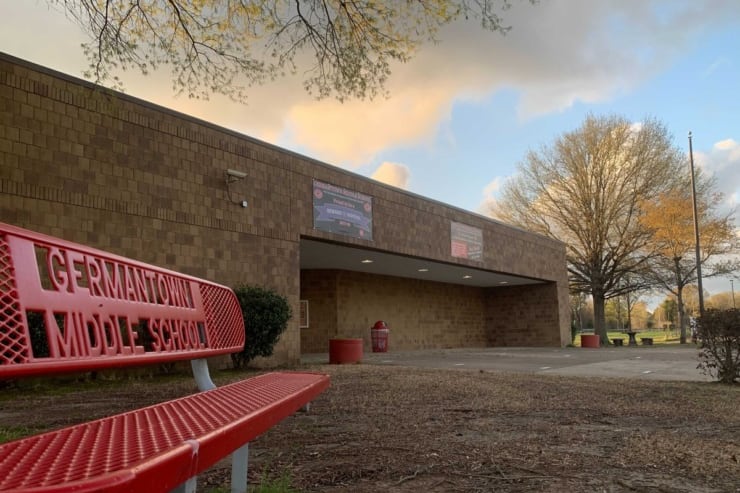Shelby County officials have pledged to kick in $72.5 million to build a new high school in the Cordova area as part of a proposed settlement in the long-running dispute over schools operated by Memphis-Shelby County Schools in Germantown.
The proposal is the result of mediation efforts led by Shelby County Mayor Lee Harris over the last few weeks, according to a joint statement issued Monday by Shelby County, MSCS, the city of Germantown and the Germantown Municipal School District.
The agreement — subject to approval by the Shelby County Commission, Germantown’s council and the two districts’ school boards — calls for Germantown to pay MSCS $5 million for Germantown elementary and middle schools, and to help Tennessee’s largest school district sell the high school building.
With the county’s pledged $72.5 million contribution, officials expect MSCS will have enough money to build a new $100 million, state-of-the-art high school, the first new MSCS district-operated high school in over a decade. The pact also allows a “multiyear transition” for affected families.
MSCS and Germantown faced a Dec. 31 deadline to reach a settlement to surrender control of Germantown’s elementary, middle and high schools — known collectively as the “three G’s” — as well as Millington’s Lucy Elementary to their respective local school districts. The deadline was part of a new state law passed this spring that says a county school district can’t operate a school within the geographic boundaries of a municipal school system, unless they have a negotiated agreement. Germantown’s mayor lobbied state lawmakers for the legislation.
Since the law was passed, MSCS officials have expressed concern that the Germantown district didn’t have a long-term plan for the thousands of MSCS students who would be displaced if it took ownership of the three schools and closed or repurposed the buildings on the expansive school campus.
The status of negotiations between MSCS and Millington remained unclear as of Monday. Millington plans to use Lucy Elementary as a school, MSCS officials told the Shelby County Commission last week.
In a statement to Chalkbeat, MSCS board Chair Althea Greene said the district is continuing talks with Millington leaders and hopes for an “equally positive outcome for the 350 members of our Lucy Elementary School family.”
Greene said the county funding and multiyear transition mean that “all involved have heard the united voices of our staff and students” who have “strongly expressed their desire to stay together.”
In October, a group of more than 20 Germantown High School students organized a press conference to advocate for the three schools to remain open and part of MSCS.
When news of the agreement came out Monday afternoon, six of those students were sitting outside the district’s radio station, preparing to continue their advocacy work through an on-air interview. They reacted with excitement and pride, and said they were glad they decided to speak up.
“It let us know that our voices were heard and we can make a difference,” said Ann Truong, a junior at Germantown High.
Germantown school officials have sought the school property for a decade. MSCS retained the schools in a 2013 legal settlement after Germantown and other suburbs pulled out of the merged Memphis and Shelby County school systems to create their own school systems.
MSCS leaders have said that underlying the tug-of-war between the districts are racial and class divisions. Most of the students at the three Germantown schools are Black, and about a third are considered economically disadvantaged. Most students attending Germantown district schools, meanwhile, are white, and just 5% come from low-income families.
Most of the three schools’ students live in unincorporated areas near Germantown, outside the suburb, or have chosen to attend the school through MSCS’ optional schools program. Optional schools serve a mix of students who are zoned to the building and those who enroll into the school because it caters to unique interests and learning styles.
Germantown Elementary boasts an international studies program, the middle school has a college preparatory program, and the high school offers both a creative and performing arts program, as well as an International Baccalaureate program.
The opportunity to participate in such programs in Germantown is what led Cindy Orellana to transfer out of her small school in seventh grade. Now in 11th grade, Orellana currently participates in Germantown High School’s IB program.
“We’re not just doing this for us. We’re doing this for the kids who come after us,” Orellana said. There are plenty of kids who are waiting for their opportunity to go to Germantown, and this is not just a fight for us, this is a fight for everybody.”
Interim Superintendent Toni Williams said the agreement she helped negotiate reflects those voices.
“I have listened to Memphis-Shelby County Schools’ parents, staff, and students as they expressed their desire to stay united as a faculty, family, and class body,” Williams said in Monday’s press release. “Thus, I greatly appreciate Shelby County Government’s support that will ensure our students have the facilities and rich programming they deserve.”
Germantown’s Board of Aldermen will vote on the settlement Dec. 12, followed by the Shelby County Commission on Dec. 14. The MSCS and Germantown school boards will both vote Dec. 15.
Samantha West is a reporter for Chalkbeat Tennessee, where she covers K-12 education in Memphis. Connect with Samantha at swest@chalkbeat.org.






